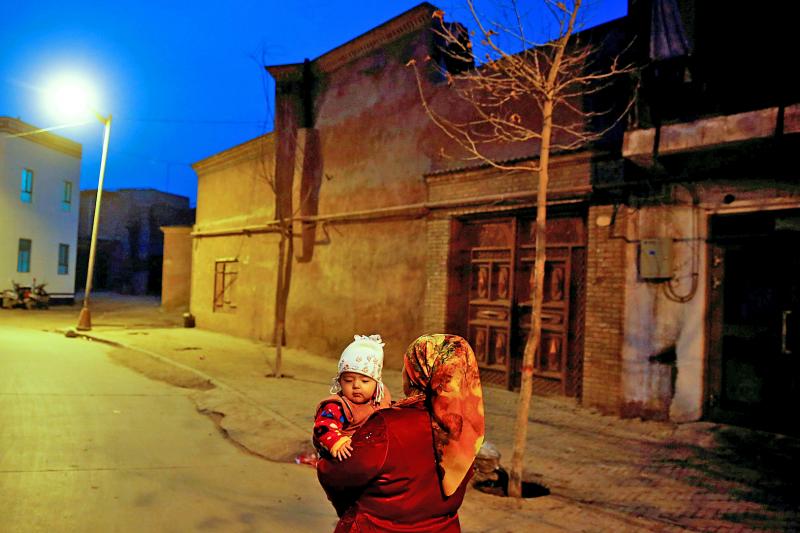Chinese policies aimed specifically at reducing the population of mainly Muslim Uighurs in Xinjiang could prevent the birth of about 4 million babies over the next two decades, new research has found.
Projections show reduced minority birthrates could raise the proportion of Han Chinese from 8.4 percent to 25 percent in southern Xinjiang.
Beijing has for years sought to tighten its grip on the vast border area historically marked by economic inequality and sporadic outbreaks of unrest.

Photo: Reuters
Millions of Han Chinese have relocated to Xinjiang to find work in the coal and gas-rich region in a settlement drive that has caused friction.
German researcher Adrian Zenz said publicly available papers by Chinese security researchers blamed the density of minority communities as the “underlying reason” for unrest and proposed population control as a risk-reduction method.
At the same time, documented official fears about the arid region’s lack of natural resources to support an influx of Han Chinese settlers suggest that the authorities see birth suppression as a key tool for manipulating the area’s demographic makeup, Zenz said.
China last week announced a major reform of policy governing the number of children a couple can have, increasing it to three as the nation grapples with an aging population, but academics say that Beijing does not view all babies as equally desirable in Xinjiang and is pursuing a policy of decreasing the number of children born to ethnic minorities.
Strategies include ramped-up birth control policies in the region — including imprisonment for having too many children and claims of forced sterilization.
Focusing on four prefectures in southern Xinjiang and using models recommended by multiple Chinese academics, Zenz calculated that Beijing could aim to raise the number of Han Chinese in the “traditional Uighur heartlands” to one-quarter of the population.
Zenz said that he found “an intent to reduce ethnic minority population growth in order to increase the proportionate Han population in southern Xinjiang.”
Official data show Xinjiang’s birthrate nearly halved between 2017 and 2019 — the steepest drop of all Chinese regions and the most extreme globally since 1950, an analysis by the Australian Strategic Policy Institute showed.
Zenz calculated the natural ethnic minority population growth in southern Xinjiang would have reached 13.14 million by 2040, but that suppression measures could prevent up to 4.5 million births among Uighurs and other ethnic minorities.
China has faced mounting international criticism over its policies in Xinjiang, where the US says Beijing is committing genocide.

A magnitude 5.6 earthquake struck off the coast of Yilan County at 12:37pm today, with clear shaking felt across much of northern Taiwan. There were no immediate reports of damage. The epicenter of the quake was 16.9km east-southeast of Yilan County Hall offshore at a depth of 66.8km, Central Weather Administration (CWA) data showed. The maximum intensity registered at a 4 in Yilan County’s Nanao Township (南澳) on Taiwan’s seven-tier scale. Other parts of Yilan, as well as certain areas of Hualien County, Taipei, New Taipei City, Taoyuan, Hsinchu County, Taichung and Miaoli County, recorded intensities of 3. Residents of Yilan County and Taipei received

Taiwan has secured another breakthrough in fruit exports, with jujubes, dragon fruit and lychees approved for shipment to the EU, the Ministry of Agriculture said yesterday. The Animal and Plant Health Inspection Agency on Thursday received formal notification of the approval from the EU, the ministry said, adding that the decision was expected to expand Taiwanese fruit producers’ access to high-end European markets. Taiwan exported 126 tonnes of lychees last year, valued at US$1.48 million, with Japan accounting for 102 tonnes. Other export destinations included New Zealand, Hong Kong, the US and Australia, ministry data showed. Jujube exports totaled 103 tonnes, valued at

TRUST: The KMT said it respected the US’ timing and considerations, and hoped it would continue to honor its commitments to helping Taiwan bolster its defenses and deterrence US President Donald Trump is delaying a multibillion-dollar arms sale to Taiwan to ensure his visit to Beijing is successful, a New York Times report said. The weapons sales package has stalled in the US Department of State, the report said, citing US officials it did not identify. The White House has told agencies not to push forward ahead of Trump’s meeting with Chinese President Xi Jinping (習近平), it said. The two last month held a phone call to discuss trade and geopolitical flashpoints ahead of the summit. Xi raised the Taiwan issue and urged the US to handle arms sales to

BIG SPENDERS: Foreign investors bought the most Taiwan equities since 2005, signaling confidence that an AI boom would continue to benefit chipmakers Taiwan Semiconductor Manufacturing Co’s (TSMC, 台積電) market capitalization swelled to US$2 trillion for the first time following a 4.25 percent rally in its American depositary receipts (ADR) overnight, putting the world’s biggest contract chipmaker sixth on the list of the world’s biggest companies by market capitalization, just behind Amazon.com Inc. The site CompaniesMarketcap.com ranked TSMC ahead of Saudi Aramco and Meta Platforms Inc. The Taiwanese company’s ADRs on Tuesday surged to US$385.75 on the New York Stock Exchange, as strong demand for artificial intelligence (AI) applications led to chip supply constraints and boost revenue growth to record-breaking levels. Each TSMC ADR represents